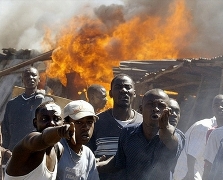Kenya’s political crisis raises international concern
January 2, 2007 (NAIROBI) — Young men armed with machetes manned roadblocks in Kenya on Wednesday as world powers stepped up efforts to end a wave of tribal violence over a disputed presidential election that threatens to tear the country apart.
 Adding to chaos that included the torching of a church packed with panic-stricken villagers, the head of Kenya’s electoral commission was quoted as saying he did not know whether President Mwai Kibaki had won the vote.
Adding to chaos that included the torching of a church packed with panic-stricken villagers, the head of Kenya’s electoral commission was quoted as saying he did not know whether President Mwai Kibaki had won the vote.
The statement attributed to Samuel Kivuitu, who announced on Sunday that Kibaki had narrowly beaten opposition rival Raila Odinga, could not be immediately verified.
The African Union (AU) chairman is due in Kenya on Wednesday for crisis talks with Kibaki after the death toll neared 250 in the east African nation, the region’s biggest economy.
Western powers have called for calm and warned citizens against visiting a popular tourist destination that had been regarded as one of the most stable democracies on a volatile continent.
In the most grisly incident in a spasm of ethnic clashes, about 30 members of Kibaki’s Kikuyu ethnic group were burned alive on Tuesday when a mob set fire to the church where they were hiding near Eldoret town.
Pictures of the area in western Kenya filmed from a helicopter by the Red Cross showed plumes of white smoke billowing from dozens of blazing homesteads.
Young men with machetes, rocks and bows and arrows could be seen manning crude checkpoints on highways.
Armed gangs were marching on the nearby Burnt Forest, part of the fertile Rift Valley that is home to many Kikuyus, local broadcaster NTV said.
Britain has called on the AU and Commonwealth to try to reconcile Kibaki and Odinga whose parties both accuse the other of vote-rigging during the Dec. 27 poll.
AU chairman John Kufuor had agreed to help start a process of dialogue and reconciliation, British Prime Minister Gordon Brown said: “This offers an opportunity to stop the violence and to help Kenyans unite.” Britain was Kenya’s colonial power.
The attack in Eldoret revived traumatic memories in east Africa of the slaughter in churches of tens of thousands of victims of Rwanda’s 1994 genocide, and the mass suicide of hundreds of Ugandan cult members in a church fire in 2000.
POLL CHIEF ‘PRESSURED’
Kibaki was sworn in on Sunday after the official election results showed he had narrowly beaten Odinga. The EU observer mission said the exercise had “fallen short of key international and regional standards for democratic elections”.
Washington had first congratulated Kibaki, then switched to expressing “concerns about irregularities”.
In remarks carried on the Standard’s Web site, Kivuitu said he was pressured by members of the president’s party who called him frequently and asked him to announce the results immediately.
“I do not know whether Kibaki won the election,” Kivuitu was reported as saying. No independent confirmation of the reported remarks was available.
The delays announcing the final outcome had prompted allegations of rigging from Odinga’s team. Four members of Kivuitu’s team have said they would call for a judicial review.
The explosion of long-simmering tribal tensions from the shores of Lake Victoria to its Indian Ocean coast had displaced more than 70,000 people nationwide, police said. Reuters reporters around Kenya estimated the death toll at around 250.
The capital’s streets had been quieter on New Year’s Day than on Monday. But, as dusk fell, gunfire crackled when battles between police and protesters in the slums erupted again.
Terrified Nairobi residents feared members of Mungiki, a shadowy gang with its roots in Kikuyu traditional rituals, and the “Taliban”, a gang of mostly ethnic Luos who support Odinga, would launch reprisal attacks.
Vincent Ochieng nursed a gaping head wound after about 100 Mungiki youths raided the capital’s ethnically mixed Kiambiu shanty-town on Tuesday and hacked five people to death.
“First it was protests, then it got violent, now this is revenge,” he told Reuters.
(Reuters)

Juach D Juach
Kenya’s political crisis raises international concern
With experiences of war situation in the Sudan, it pains many South Sudanese to see Kenyan going down the wrong way! The political, Spiritual leaders and all stake holders in Kenya have to unite the people and bring the African icon back on its tracks …
May wisedom prevail on Kenyan masses to realise that war only brings hardship on individuals and the whole nation. I wouldn’t be happy to see Kenyan taking refuge in sudan or any other nation in the World and goes through the hard life of a refugee in … !
Victoria Naculya
Kenya’s political crisis raises international concern
That is what happens, when the same tribe takes over, over, and over again the government every time of election. The same tribe ruling the people of Kenya from generation to generation. What else does the world expect from the rest of the tribes??? The government of Kenya is a good example of the government of Sudan. the same Jalaba ruling the Sudan since the begining, not giving a chance for a southerner to take over. That is why there is now the SPLM/A.